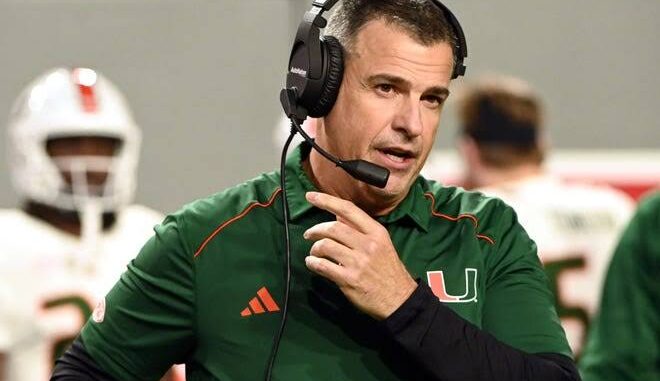
In a dramatic turn of events that has captured the attention of college football fans and pundits alike, the University of Miami Hurricanes’ name, image, and likeness (NIL) deal for five-star quarterback recruit Jackson Cantwell is facing significant scrutiny. The deal, reportedly valued at several million dollars, has ignited a fierce debate over the ethics of college athletics and the implications of NIL compensations in recruiting.
### Background: Who is Jackson Cantwell?
Jackson Cantwell, a dual-threat quarterback from Naples, Florida, is regarded as one of the top prospects in the nation for the Class of 2024. Armed with a potent arm and impressive mobility, Cantwell led his high school team to a championship, drawing comparisons to some of the game’s greats. His commitment to the Hurricanes, announced last week amidst much fanfare, was celebrated as a significant victory for head coach Mario Cristobal’s revitalization of the program.
### The Controversy Begins
The uproar erupted when reports surfaced detailing the extravagant NIL package offered to Cantwell. According to sources, the deal includes a combination of cash payments, endorsements, and promotional appearances that could exceed $5 million by the time he enrolls at the university. While NIL deals are now commonplace since the NCAA loosened its regulations on athlete compensation, the scale of Cantwell’s agreement has raised eyebrows.
Critics argue that such monumental financial offers could create an uneven playing field in college football, as wealthier programs could lure top prospects away from schools with fewer financial resources. Proponents of Cantwell’s NIL deal, however, contend that it reflects the reality of modern college sports, where branding and marketability play pivotal roles in recruitment.
### Ethical Implications and Reactions
The fallout has been swift. Many voices in the college football community have come forward to voice their concerns. Former Heisman Trophy winner Tim Tebow commented, “It’s great to see young athletes being compensated, but we must ensure that the integrity of the sport remains intact. We cannot let money overshadow talent and hard work.”
Meanwhile, college football analyst Kirk Herbstreit emphasized the potential consequences of such high-stakes deals. “What’s next? Are we going to have bidding wars for every five-star recruit? This could lead to unprecedented levels of corruption within college athletics,” he cautioned.
Further complicating matters, some current college athletes have echoed these sentiments, arguing that the increased emphasis on NIL deals might detract from team unity and focus. Several players have expressed concerns that the pursuit of financial gain could lead to a divisive atmosphere within locker rooms that once thrived on camaraderie and collective effort.
### Miami’s Response
In response to the escalating criticism, the University of Miami released a statement supporting Cantwell’s NIL opportunities. “The University of Miami is committed to providing all our student-athletes with the resources and support they need to thrive, both on the field and in their personal lives. We are proud of the success of our players and are dedicated to helping them maximize their potential in a rapidly evolving landscape,” the statement read.
Mario Cristobal has also stood firmly behind his commitment to ensuring that Miami remains competitive in recruiting. “We’re in a different era of college football. To compete at the highest level, we must adapt to these changes. What we’re seeing is a reflection of the new norms in college athletics,” he said during a press conference.
### NCAA’s Potential Involvement
With the growing concern over the implications of NIL deals, the NCAA may soon find itself compelled to revisit its policies. While NIL activities are currently regulated by
Leave a Reply